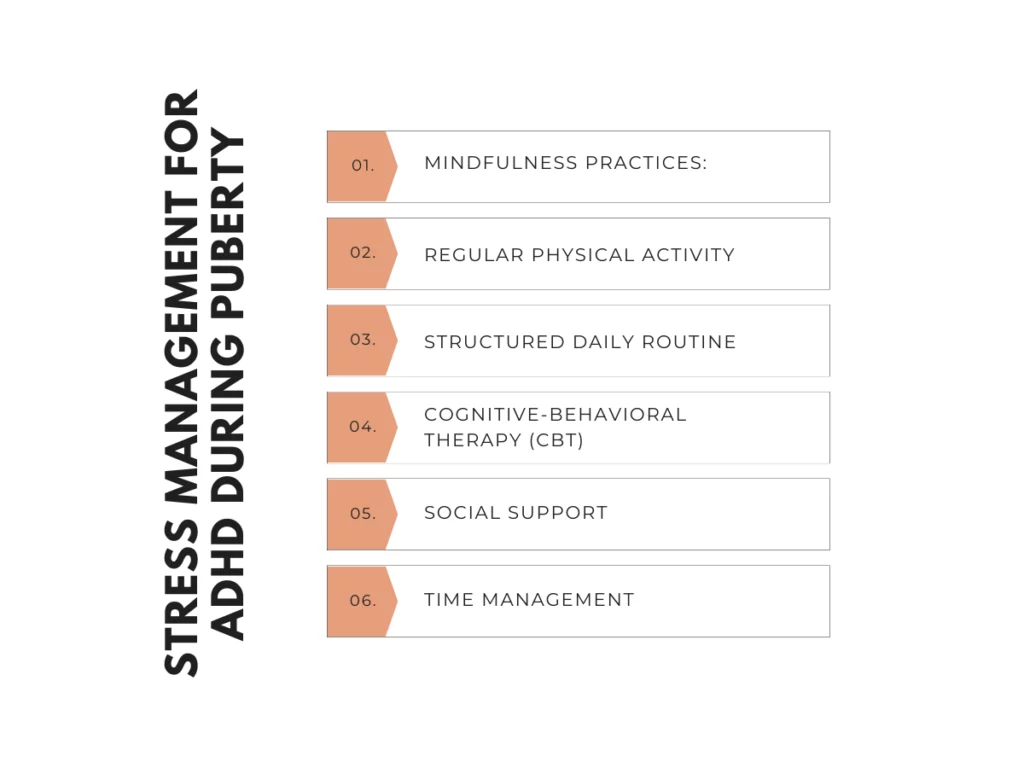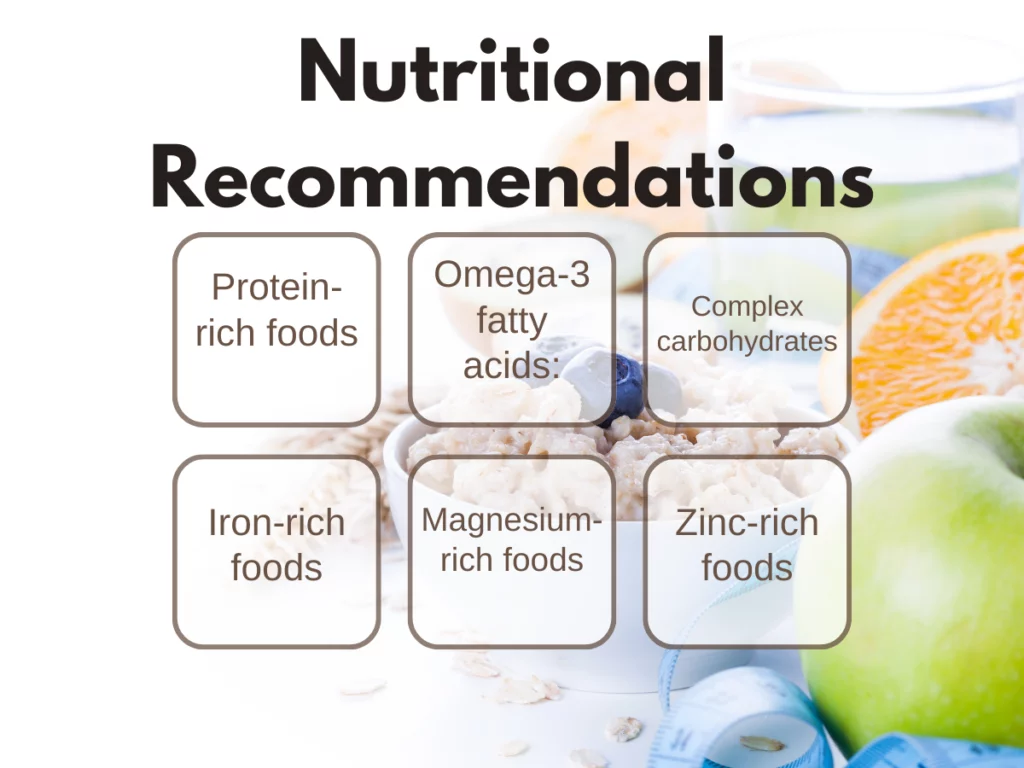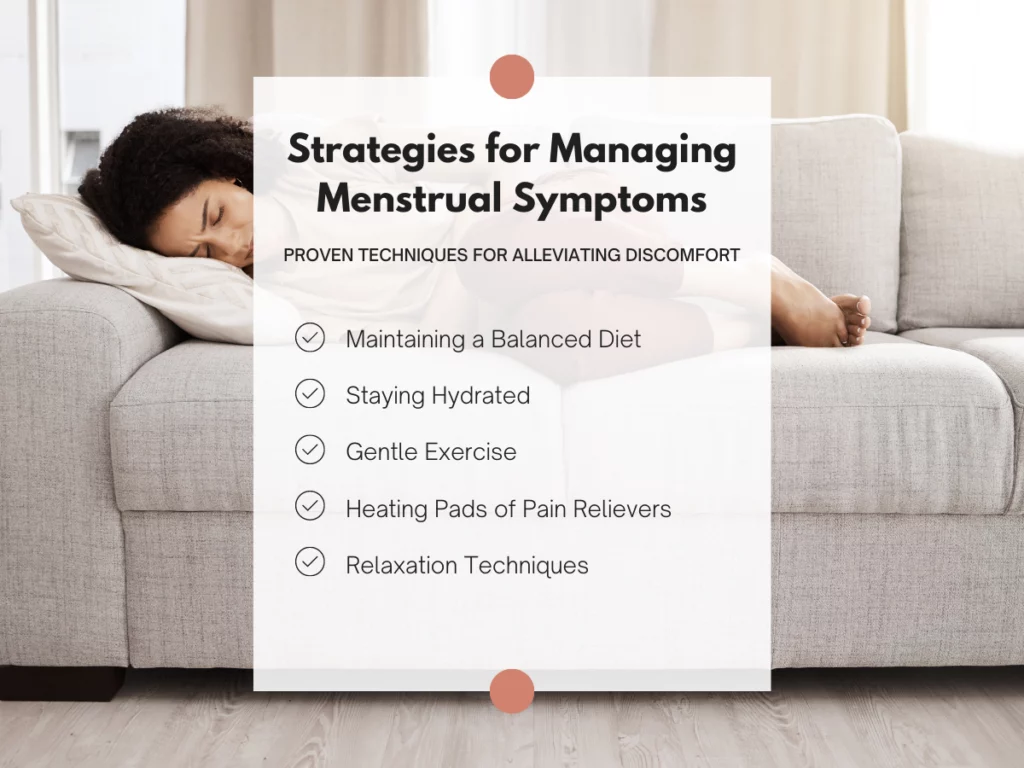Understanding Puberty
Puberty is a time of major changes in a child’s body. During this time, the brain also undergoes changes that can affect a child’s ADHD symptoms. It’s important to understand that these changes are normal and that managing ADHD during this period may require adjusting your approach. For example, your child may need more breaks and downtime to refocus or more structure and routine to help them manage their symptoms.Puberty and ADHD
It is important to remember that puberty causes hormonal changes that can exacerbate ADHD symptoms and make it challenging to regulate emotions. However, it’s essential to understand that these struggles are common and that there are helpful strategies to overcome them. Seeking professional help from specialists, such as online therapists specializing in ADHD, can effectively manage symptoms and develop coping mechanisms. Online therapy for ADHD provides personalized guidance on improving executive functioning skills, such as time management, planning, and organization, which can significantly benefit individuals who struggle with ADHD during puberty. Additionally, addressing low self-esteem can also help individuals manage their emotions effectively. It’s crucial for individuals with ADHD to understand that they’re not alone and that using mental health support or seeking professional help can make a significant difference in managing their symptoms.Managing ADHD During Puberty and Hormonal Changes
ADHD, Hormones, and Boys
Managing hormonal changes in boys with ADHD can be a challenging task. However, there are some practical strategies and techniques that parents and caregivers can implement to help their child manage their symptoms effectively.
Creating Systems for Boys with ADHD
Parents can also work with their children to create a system for managing forgetfulness, disorganization, and difficulty focusing.
This might involve creating a schedule, using reminder apps or setting alarms, and breaking down tasks into manageable steps.
Behavioral therapy can also be an effective approach to help children with ADHD improve their impulse control and reduce risk-taking behaviors and overall mental health.
Hormonal Changes in Girls with ADHD

Creating a Routine for Girls with ADHD
Creating a routine is crucial for managing hormonal changes in girls with ADHD. Consistency and structure can help reduce stress and anxiety, leading to better-coping mechanisms. Ensuring adequate sleep is vital for maintaining emotional stability, cognitive function, and overall physical health.Stress Management for ADHD during Puberty
Managing stress is another big aspect of managing hormonal changes in girls and boys with ADHD. One key strategy is to help the child develop good coping mechanisms for mood swings and impulsivity.
Proven Techniques to Manage Stress and ADHD
Mindfulness practices: Activities such as meditation, journaling, deep breathing exercises, and yoga can help individuals with ADHD develop a sense of calm, improve focus, and reduce stress during puberty.-
Regular physical activity: Engaging in regular exercise like walking, swimming, or cycling can help alleviate stress, boost mood, and promote overall well-being during this critical phase.
-
Structured daily routine: Creating and maintaining a consistent daily routine can provide predictability and structure for individuals with ADHD during puberty.
-
Time management: Utilizing time management tools like calendars, planners, and to-do lists can help adolescents with ADHD stay organized and reduce stress.
-
Break tasks into smaller steps: Breaking tasks into smaller, manageable steps can make them feel less overwhelming and help reduce stress during puberty.
-
Social support: Connecting with friends, family, or support groups can provide emotional support and practical advice for managing ADHD and stress during this challenging stage.
-
Cognitive-behavioral therapy (CBT): Working with an online therapist specializing in CBT can help individuals with ADHD develop strategies to manage stress and improve coping skills during puberty.
-
Relaxation techniques: Practicing relaxation techniques, such as progressive muscle relaxation, guided imagery, or listening to calming music, can help reduce stress and anxiety during puberty.
-
Adequate sleep: Prioritizing sleep and establishing a consistent sleep schedule can help improve focus, mood, and overall well-being during this critical stage.
-
Healthy diet: Consuming a balanced diet rich in whole grains, lean proteins, fruits, and vegetables can provide the necessary nutrients to support brain health and reduce stress during puberty.
Parents and caregivers should also empower their children to communicate openly about their emotions and feelings, creating a safe space to express themselves.
Nutrition and Hormones for ADHD during Puberty
Nutritional recommendations can also play a significant role in managing ADHD symptoms during puberty. A protein-rich diet of fruits, vegetables, and whole grains can help stabilize blood sugar levels and improve focus and attention.Parents should encourage their children to engage in physical exercise regularly and maintain a healthy diet to support hormone levels and ensure optimal brain function. Some examples include;
-
Protein-rich foods: Including lean meats, poultry, fish, eggs, beans, lentils, tofu, and low-fat dairy products can help improve focus and cognitive function.
-
Omega-3 fatty acids: Foods rich in omega-3 fatty acids, such as salmon, tuna, mackerel, flaxseeds, chia seeds, and walnuts, can support brain health and overall mental well-being.
-
Complex carbohydrates: Whole grains, such as brown rice, quinoa, whole wheat bread, and oats, provide sustained energy and help maintain stable blood sugar levels, which can be crucial for managing ADHD symptoms.
-
Fruits and vegetables: Consuming a variety of colorful fruits and vegetables provides essential vitamins, minerals, and antioxidants that can support brain health and overall well-being. Examples include leafy greens, berries, oranges, apples, and bell peppers.
-
Iron-rich foods: Iron deficiency has been linked to cognitive and behavioral issues in children with ADHD. Incorporating iron-rich foods like spinach, beans, fortified cereals, and lean red meat can help support cognitive function.
-
Magnesium-rich foods: Magnesium is essential for proper brain function, and a deficiency can worsen ADHD symptoms. Foods high in magnesium include almonds, cashews, pumpkin seeds, spinach, and avocado.
-
Zinc-rich foods: Zinc plays a vital role in regulating neurotransmitters in the brain. Zinc-rich foods include oysters, beef, turkey, chickpeas, pumpkin seeds, and fortified cereals.
-
Calcium-rich foods: Calcium is necessary for overall health, including brain function. The diet includes calcium-rich sources such as milk, yogurt, cheese, kale, broccoli, and almonds.
-
Avoiding processed foods and sugar: Limiting processed foods, sugary snacks, and drinks can help stabilize blood sugar levels, potentially reducing ADHD symptoms.
-
Staying hydrated: Drinking sufficient water throughout the day is essential for overall health, including cognitive function.

Medication for Kids with ADHD during Puberty
Choosing the Right ADHD Medication
Medication for kids with ADHD during puberty can be a critical component in managing symptoms, as hormonal changes often intensify challenges related to focus, impulsivity, and emotional regulation.
When considering ADHD medications, it’s essential to research and weigh the benefits and potential side effects of various options, such as stimulants or non-stimulants, to find the most suitable treatment.
Working with Healthcare Professionals for Optimal Treatment
Collaborating with healthcare professionals, including pediatricians, psychiatrists, or therapists specializing in ADHD, is crucial in making informed decisions about medication adjustments or dosage changes during this pivotal stage.
Staying informed about the latest ADHD medication advancements and working closely with healthcare providers, parents, and guardians can ensure their child receives the most effective treatment to manage ADHD symptoms during puberty, ultimately enhancing their quality of life and long-term success.
Strategies for Managing Menstrual Symptoms
Girls with ADHD may also experience more severe menstrual symptoms than their peers. These symptoms can include cramps, headaches, and emotional changes.
Proven Techniques for Alleviating Discomfort
By implementing practical strategies, you can alleviate discomfort and maintain focus. These proven techniques include:
Maintaining a balanced diet: Consuming nutrient-rich foods can help reduce fatigue, stabilize mood, and improve focus during your period.
Staying hydrated: Drinking enough water can help alleviate bloating and reduce headaches associated with menstruation and ADHD.
Gentle exercise: Engaging in light physical activities like walking or stretching can alleviate cramps and boost mood.
Heating pads or pain relievers: Using heating pads or taking over-the-counter pain relievers can provide relief from menstrual pain and help with ADHD-related discomfort.
Relaxation techniques: Practicing deep breathing exercises, meditation, or yoga can help reduce stress and anxiety often associated with menstruation and ADHD.

Regulating Emotions with ADHD During Puberty
Managing emotions during puberty can be particularly challenging for individuals with ADHD, as hormonal shifts often intensify symptoms and make emotional regulation more difficult.Here are 3 Key ways to regulate emotions with ADHD during puberty:
-
Combining mindfulness practices such as deep breathing exercises, meditation, or yoga to cope with these changes effectively can provide a sense of calm and improved focus.
-
Maintaining a structured daily routine is also essential for those with ADHD, as it promotes consistency and predictability.
-
Engaging in gentle exercise, like walking or swimming, can help alleviate stress and support overall well-being.
By implementing these strategies and staying informed about the latest ADHD management techniques, individuals can successfully navigate the complexities of puberty while maintaining emotional stability and enhancing their quality of life.
Communication is Key
Throughout puberty and the teenage years, communication is crucial in managing ADHD symptoms. Please encourage your child to talk to you about their symptoms, struggles, and successes.
Strategies for Improving Communication Skills
Key strategies for improving communication include-
active listening
-
expressing empathy”
-
practicing assertiveness while also considering ADHD-related challenges such as impulsivity or inattention.
Building Stronger Relationships and Support Networks
Additionally, developing emotional intelligence and honing the ability to adapt communication styles to different situations or audiences can contribute to more meaningful connections and positive outcomes. Engaging in open conversations with parents, teachers, and healthcare professionals can help individuals with ADHD receive the necessary support and guidance they need during puberty.Including Your Adolescent in the ADHD Process
Empowering the child to be part of the decision-making process regarding their treatment and care can help them feel more in control of their life and improve their overall well-being. This includes discussing treatment options, possible side effects, medication management practices, and working together to create an effective medication management plan. By prioritizing effective communication and implementing these proven strategies, adolescents with ADHD can build stronger relationships, navigate puberty confidently, and establish a supportive network for long-term success.Seek Support
Seeking support is essential for individuals with ADHD, as it can significantly improve emotional well-being, promote effective coping strategies, and enhance the overall quality of life.Benefits of ADHD Support Networks
Establishing connections with professionals, such as therapists, psychologists, or psychiatrists specializing in ADHD treatment, can provide valuable guidance and tailored solutions for managing symptoms.
Navigating ADHD during puberty, hormonal changes and menstrual cycles can be challenging.
Fortunately, online therapy for ADHD offers a tailored approach to managing these unique challenges.
These reputable support groups offer a platform for sharing experiences, learning from experts, and connecting with other parents facing similar situations:
-
CHADD (Children and Adults with Attention-Deficit/Hyperactivity Disorder): A leading non-profit organization offering resources, local chapters, webinars, and an online community for parents of children with ADHD. Visit their website
-
ADDitude Magazine’s Parenting ADHD Support Group: An online forum where parents can ask questions, share tips, and connect with others facing the unique challenges of parenting a child with ADHD. Join the group
-
Understood.org: A user-friendly platform offering expert advice, personalized resources, and access to a supportive community for parents of children with ADHD and other learning differences. Explore their resources
-
ADHD Parent Support Group on Facebook: A closed group where parents can share experiences, ask questions, and receive support from fellow members in a safe and moderated environment. Request to join
Rising Perspective Counseling – Online Therapy in Texas

Rising Perspective Counseling specializes in helping people navigate the complexities of ADHD during pivotal life changes.
Our online therapy services in Texas provide valuable tools and resources for parents and individuals seeking effective support for ADHD management.
Explore trusted sources and educational resources to learn more about managing ADHD during puberty and hormonal changes.
Don’t let ADHD hold you back during puberty, hormonal changes, or menstrual cycles. Reach out to Rising Perspective Counseling today for a free consultation and take the first step towards effective ADHD management during these crucial life changes.
Connecting with Professionals and Peers for Optimal Outcomes
Finally, it’s essential for parents to seek support and resources as they navigate this challenging phase.
Joining support groups for parents of children with ADHD, seeking counseling, or working with an online therapist can help parents manage their concerns and better support their child’s mental health and long-term psychological well-being.
Engaging with peers through support groups or online forums can offer practical advice, shared experiences, and a sense of belonging, helping to reduce feelings of isolation often associated with ADHD.
By actively seeking support and collaborating with healthcare professionals and fellow ADHD community members, individuals can gain valuable insights, build resilience, and successfully navigate the challenges of ADHD management, leading to a more fulfilling and balanced life.
Guide to Choosing the Best Online ADHD Therapy
Psychotherapist Nic Hardy says Online Therapy is the only effective way to treat ADHD in a patient.
If you need a professional ADHD treatment program, he says getting a provider who knows what to expect is critical. It provides individuals with accurate information and dispels some commonly accepted mythical beliefs,” Hardy explains.
What to Look for in Online Therapy for ADHD
When searching for online therapy in Texas or elsewhere, consider factors such as the therapist’s qualifications, expertise in ADHD treatment, and approach to therapy.
Additionally, evaluate the frequency of sessions, mode of communication (video call, phone call, or chat), and the pricing structure to ensure it fits your preferences and budget.
Rising Perspective Counseling Specializes in ADHD
Rising Perspective Counseling provides online therapy for individuals struggling with managing life with ADHD, Depression, Anxiety disorders, and Low Self Esteem.
Want to see if our online therapy service is a good fit for you?
We can refer you to other mental health services and professionals if we don’t think we can meet your needs.
Conclusion: A Guide to Overcoming ADHD During Puberty, Menstruation, and Hormonal Changes
In conclusion, overcoming ADHD during puberty, menstruation, and hormonal changes is a multi-faceted journey that requires understanding, support, and effective strategies.
The key takeaways from our comprehensive guide include the following:
-
Collaboration with healthcare professionals for optimal ADHD treatment and medication management during puberty and menstruation.
-
Seeking support from professionals, peers, and support groups to foster emotional well-being and build resilience.
-
Implementing practical strategies for managing menstrual symptoms and ADHD-related challenges during this period.
-
Prioritizing effective communication to strengthen relationships, navigate challenges, and establish a supportive network.
Remember, there is no one-size-fits-all approach to managing ADHD; what works for one child may not work for another. Be open to adjusting your strategies and seeking support as needed.
Managing ADHD during puberty, menstruation, and hormonal changes requires patience, understanding, and flexibility.
By following the tips and strategies outlined in this guide, you can help your child manage their symptoms and navigate this challenging period successfully.


